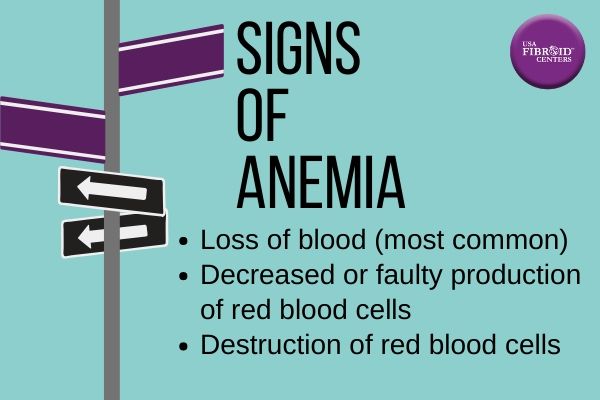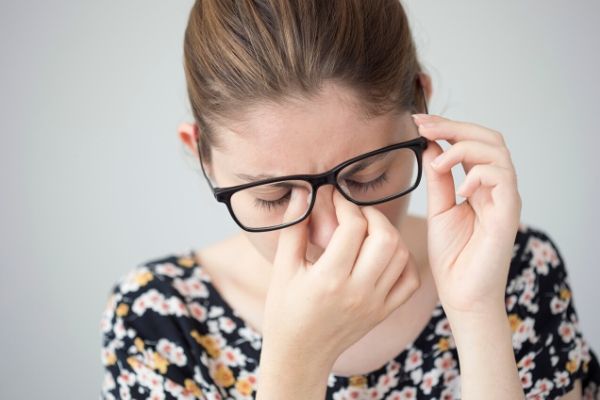
Topics Covered in this blog
- What is Anemia?
- Symptoms of Anemia
- Can Fibroids Cause Anemia?
- Does Fibroid Size Affect Anemia?
- Different Forms of Anemia
- Anemia in Pregnancy
- CBC Testing for Anemia and Fibroids
- Blood Loss From Fibroids
- Fibroids Treatment with Uterine Fibroid Embolization
- Anemia Treatment
- Visit USA Fibroid Centers Today for Fibroid Removal
Fibroids, noncancerous tumors that grow within the uterus, can come with many painful, and sometimes debilitating, symptoms. Heavy or excessive bleeding during and between your period is the most common symptom, occurring in about one-third of women with fibroids, and can result in life-threatening anemia.
Anemia from fibroids is a condition which can leave you feeling tired and weak. Such fatigue can affect your career, relationships, and ability to perform even basic daily tasks. We want you to know that when it comes to heavy menstrual bleeding and anemia due to fibroids, effective treatment is available. You can use our symptom checker to determine if you may have fibroids and need to see a specialist.
Take our symptom quiz
What is Anemia?
Anemia is a condition that indicates your body doesn’t have enough red blood cells to carry oxygen from the lungs to different parts of the body, or there is a shortage of iron-rich protein called hemoglobin (Hb) in your blood. Without oxygen, it is difficult for your body to make more red blood cells.
Mild anemia is common but treatable. Women who have menstrual cycles or are pregnant are at a higher risk of developing anemia. Anyone who does not consume enough iron in their diet is also at risk. Iron is necessary for the production of red blood cells.
Symptoms of Anemia
If you have anemia, you may not realize it at first. Symptoms can start mild and worsen if the anemia escalates. Some symptoms to watch for include:
- Fatigue
- Weakness
- Pale or yellow-tinted skin
- Irregular heartbeat
- Shortness of breath
- Dizziness or lightheaded feeling
- Chest pain
- Cold hands and feet
- Headaches
- Loss of blood (most common)
- Decreased or faulty production of red blood cells
- Destruction of red blood cells
Can Fibroids Cause Anemia?
Fibroids are the most common tumors of the female reproductive system. Although noncancerous, they can present a range of symptoms such as:
- Heavy or prolonged menstruation
- Anemia-induced fatigue
- Pelvic or lower back pain
- Constipation
- Stomach bloating
- Frequent urination
- Painful sexual intercourse
- Severe cramps or pelvic pressure
Fibroids can range in size, from as tiny as a pea to as large as a melon. Even when small in size, fibroids can cause heavy, prolonged periods or bleeding between menstrual cycles, which can lead to other health issues. Fibroids can increase the area of the uterine lining and menstrual flow and decrease the natural ability of the lining to stop the bleeding. Increased bleeding in the uterine cavity due to fibroids may result in the formation of clots that can cause pain due to distension of the womb and passage of the clots.
Different kinds of fibroids may cause more bleeding than others as well. Submucosal fibroids located within the uterine lining can cause severe bleeding by increasing the area of the lining and thus the flow of menstrual cycles. Moreover, fibroids lying within the uterine muscle (intramural fibroids) may increase blood flow to the uterus, which affects its ability to control blood. Intramural fibroids can also increase the size of the uterine cavity. All of these factors collectively result in increased menstrual flow.
Does Fibroid Size Affect Anemia?
As fibroids grow, they are more likely to cause symptoms to appear, including anemia from heavy bleeding. The size of the fibroid can vary from the size of a cherry to larger than a grapefruit. As they grow, the fibroids are more likely to cause heavy bleeding during your period, bleeding in between periods, frequent urination, and pain in the lower back and pelvis.
Different Forms of Anemia
Iron deficiency anemia: This is the most common type of anemia which is characterized by the overall decrease in the number of red blood cells (RBCs) and the level of hemoglobin.
Pernicious anemia: This anemia occurs when the body doesn’t produce enough intrinsic factor, a type of protein that binds with vitamin B12 for its easy absorption in the small intestine. Without a sufficient amount of intrinsic factor, the body can’t produce an optimum amount of RBCs.
Hemolytic anemia: This condition occurs when RBCs die before their normal lifespan of four months or are destroyed prematurely. The bone marrow can’t produce enough RBCs to replenish the lost ones, which decreases the blood’s capacity to carry oxygen.
Thalassemia: The condition is characterized by the body producing an abnormal form of hemoglobin that causes premature destruction of RBCs.
“Mild anemia is usually asymptomatic and most patients don’t even know they have it,” Dr. Jacob White, a fibroid specialist, explains. “But as it progresses to moderate or severe anemia, the RBCs are so depleted that symptoms start to set in.”
Anemia in Pregnancy
Pregnancy increases your risk of anemia as you supply more blood to the fetus. Most OB/GYNs recommend a multivitamin with folic acid to prevent anemia. If you have fibroids pregnant, they may cause bleeding and lead to the development of anemia.
It becomes even more difficult to recognize the symptoms of anemia in pregnancy because you may attribute them to being pregnant. This is especially true of symptoms like fatigue or insomnia.
CBC Testing for Anemia and Fibroids
If your doctor suspects that you have anemia, they may run several tests. This typically begins with checking your hemoglobin and hematocrit levels.
Hemoglobin is a protein that carries oxygen throughout the body and is located within the red blood cells. Hematocrit measures how many red blood cells there are in your blood. If the CBC notices a low level of hemoglobin or hematocrit in your system, this could be a sign of anemia.
Counting the number of RBCs and WBCs, as well as platelets in your blood. This is important to rule out any other disorders or infections that could signify a different condition.
Testing the mean corpuscular volume (MCV). This can indicate what type of anemia you may have and what the root cause of your condition is from.
Once the doctor has determined your positive diagonsis, they will look for the underlying cause. If you have symptoms that are associated with fibroids, such as heavy bleeding or prolonged menstrual cycles, they may perform a pelvic exam and order an ultrasound to detect the presence and location of the fibroids.
Blood Loss From Fibroids
In addition to the loss of blood from the body, heavy bleeding can lead to iron deficiency, which causes reduced bone marrow and worsens the degree of anemia. Be sure to address fibroids and low iron with your doctor by asking about an iron supplement for fibroids and discussing ways to avoid severe anemia due to fibroids. Iron supplementation can boost the body’s ability to make more red blood cells.
“Iron pills are readily available and easy to take (aside from a frequent side effect of constipation), but this only provides a small boost to the body’s ability to make red blood cells and cannot compensate for more serious cases of anemia,” shares Dr. White. “Intravenous iron infusion can provide much more iron for the body to make more red blood cells, but those iron stores will be depleted within a few weeks or months if a fibroid is bleeding heavily. The worst-case scenario is such severe anemia that a blood transfusion is required.”
If you experience severe anemia due to fibroids and regularly require blood transfusions to treat your anemic symptoms, it may be time to explore treatment options for the underlying cause. If left untreated, anemia can cause life-threatening complications such as congestive heart failure, angina, arrhythmia, or heart attack. Continuing to treat your anemic symptoms and not the cause of your anemia can mean a lifetime of blood transfusions and unnecessary pain.
Luckily, after treatment with Uterine Fibroid Embolization for your fibroids, most patients with fibroids and anemia experience a major reduction in their anemic symptoms. Without the heavy bleeding, the body’s natural processes for manufacturing red blood cells can reverse the anemia. Red blood cell levels can return to normal within a month or two after UFE. In most cases, anemia and fibroid symptoms will fade away, and no further iron supplementation will be needed either.
Fibroids Treatment with Uterine Fibroid Embolization
The best approach to control anemia due to fibroids is to treat the underlying cause: Your fibroids.
“Uterine fibroid embolization (UFE) is a minimally invasive same-day procedure that treats fibroids so they no longer cause heavy bleeding. The remainder of the uterus and the ovaries are unaffected, but the fibroids are treated from the inside, cutting off their blood supply to completely solve the problem,” says Dr. White. “Within a few weeks of the procedure the period will normalize and will be MUCH lighter blood flow. Without the heavy bleeding the body’s natural processes for manufacturing red blood cells are able to reverse the anemia and the red blood cell levels will return to normal within a month or two, any anemic symptoms will fade away, and no further iron supplementation will be needed.”
Keep in mind that heavy menstrual bleeding can also be a result of other causes like hormonal imbalance, dysfunction of ovaries, uterine polyps, poly-cystic ovarian syndrome, ENDOMETRIOSIS, ADENOMYOSIS, or anti-inflammatory medications. The exact cause of anemia must be determined by a doctor before opting for a treatment method.
Anemia Treatment
Treatment of anemia from uterine fibroids begins with treating the underlying cause. In this case, fibroid treatment is necessary to reduce the amount of blood loss during menstruation that causes anemia. The doctor may also recommend taking iron supplements to rebuild iron levels. They may also suggest adding vitamin B12 into the diet through foods and/or supplements.
Once the underlying cause has been treated and iron levels increase, the anemia should go away. After fibroid treatment, your menstrual cycle should become more normal.
Visit USA Fibroid Centers Today for Fibroid Removal
Our fibroid experts offer a non-surgical, outpatient procedure called Uterine Fibroid Embolization (UFE) that can shrink your fibroids, reduce your bleeding, manage your anemia, and help alleviate any other fibroid-related symptoms you’ve been experiencing.
If you are concerned about anemia and fibroids, schedule a consultation or simply call us at 855.615.2555. UFE is covered by most major health insurance plans.
Sources:
- Mayo Clinic. (Feb 2022) Anemia
- NIH (Mar, 2022) What is Anemia?





